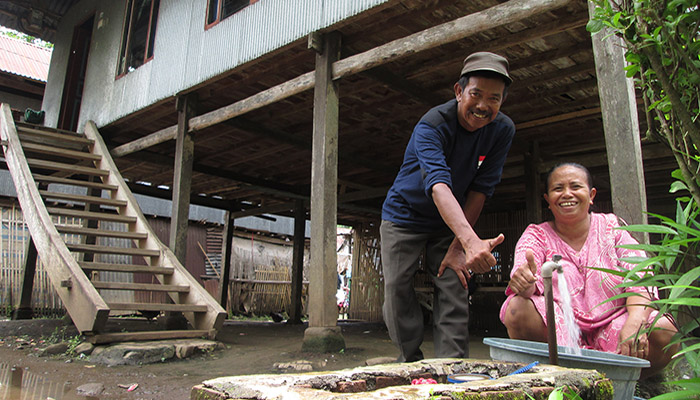Indonesia—Urban Water, Sanitation, and Hygiene (IUWASH, IUWASH PLUS, USAID IUWASH Tangguh)
Client: U.S. Agency for International Development
Duration: 2016-2027
Region: Asia and the Pacific
Country: Indonesia
Solutions: Environment
Better management of urban growth will be crucial to guarantee sustainable cities. It is not uncommon for citizens in and around Indonesia’s major cities for residents to spend up to two hours a day transporting expensive water to their homes for drinking and cooking. In addition, a lack of sewage and wastewater infrastructure in many densely populated, low-income areas leads to tainted ground and surface water, creating serious health risks from waterborne diseases.
The Indonesia Urban Resilient Water, Sanitation, and Hygiene Activity (USAID IUWASH Tangguh) strengthens inclusive, system-wide connections across stakeholders, data platforms, and finance mechanisms to achieve healthy, productive, and resilient cities. USAID IUWASH Tangguh is expected to reach at least 1.5 million people with improved access to safely managed drinking water and at least 1 million people with improved access to safe sanitation services. To achieve these ambitious targets and ensure sustainability, we will develop at least 50 public-private partnerships and mobilize at least $310 million for Indonesia’s WASH and WRM sectors.
IUWASH Penyehatan Lingkungan untuk Semua, or Environmental Health for All—(IUWASH PLUS) and its predecessor, IUWASH, brought reliable water supply and safely managed sanitation services to more than 7.6 million Indonesians.

Sample Activities
- Catalyze and facilitate local WASH and water resource management (WRM) partnerships to stimulate entrepreneurship and technology uptake, improve skills across operators and service providers, and expand and scale public-private partnerships, and other financing instruments.
- Employ data, evidence, and visualizations to support decision making and spur dialogue and action.
- Expand access to domestic, regional, and international finance by brokering arrangements between utilities and new financing facilities to support new connections as well as green, gender-responsive, and climate-resilient infrastructure.
Select Results (IUWASH and IUWASH PLUS)
- Brought reliable water supply to more than 3 million people and safely managed sanitation services to 960,000 city dwellers.
- Reduced water costs for low-income households by 57 percent.
- Built 3,700 infiltration ponds to recharge groundwater supply and mitigate the effects of climate change.
- Strengthened the capacity of more than 60 local government institutions (water supply and wastewater operators) to serve vulnerable populations in 66 cities.
- More than 183,000 people (37 percent of them women) have benefited from project training and capacity-building activities.
- Leveraged more than $240 million for WASH programs.
Select Results (Tangguh)
- Collaborated with Kesetnana villageto reforest the watershed catchment area. The 800 new trees will increase water retention, protect the soil, and ensure more regular flow of clean water. Community members also received training to monitor the effects of tree planting on the water supply.
- Revised or helped create 43 new laws, policies, or regulations that promote access to improved water, sanitation, and hygiene services.
- Mobilized $174 million in new funding to water sector via 30 public-private partnerships.
- Trained 2,300 water workers.
- Helped 25 institutions to adopt new data management systems.
- Trained 3,322 people in climate change adaptation and sustainable landscapes.
Featured Links
RELATED CONTENT:
Southeast Asia—USAID Partnerships for Green Investment
The USAID Partnerships for Green Investment program employs nature-based solutions to achieve greater emissions reduction, climate resilience, biodiversity protection, inclusiveness, and benefit sharing across Southeast Asia.
Read More